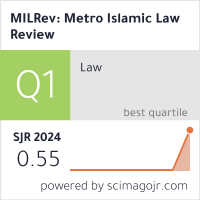Sharia Compensation Schemes and Employee Performance in Contemporary Islamic Economics
DOI:
https://doi.org/10.32332/milrev.v4i2.11192Keywords:
Contemporary Islamic Economics, Job Satisfaction, Religious Motivation, Sharia Compensation, Worker Performance.Abstract
This study investigates the role of Sharia-compliant compensation schemes in optimizing employee performance through a qualitative approach. Within the framework of contemporary Islamic economics, compensation is not only regarded as a financial reward but also as an instrument of justice, blessing, and adherence to Sharia principles. Sharia-based compensation highlights the ethical and moral dimensions of employee welfare by emphasizing material and spiritual aspects. The study underscores the mediating role of job satisfaction and the moderating influence of religious motivation in strengthening the relationship between compensation schemes and employee performance. Data were collected through in-depth interviews and participatory observations conducted at Sharia-based institutions and companies in Indonesia, ensuring contextual depth and reliability of the findings. Thematic analysis indicates that compensation aligned with Sharia values can significantly enhance employee loyalty, strengthen work ethic, and increase overall productivity. Furthermore, the spiritual dimension of compensation is essential in cultivating intrinsic motivation, particularly when supported by an ethical and religious work environment. Integrating material and non-material values creates a more holistic approach to human resource management. The findings suggest that a comprehensive Sharia compensation system has far-reaching implications, as it addresses employees’ financial well-being and contributes to their overall spiritual and psychological welfare. The study concludes by emphasizing the importance of developing HR management strategies rooted in Islamic values as a sustainable and effective pathway to improving employee performance and organizational resilience.
Downloads
References
Adriansyah, Muhammad Ali, Seger Handoyo, Hendro Margono, Sheikh Adnan Ahmed Usmani, dan Dian Dwi Nur Rahmah. “Enhancing Employability in the Digital Era: A Case Study of Online Workers Through the Lens of Contemporary Islamic Economic Law.” MILRev: Metro Islamic Law Review 4, no. 1 (2025): 99–128. https://doi.org/10.32332/milrev.v4i1.10223.
Al’Fattah, Muhammad Fariz, dan Yayuk Sri Rahayu. “Effect of Islamic Work Ethos, Compensation, Work Stress and Work Life Balance on the Performance of Syariah Banking Employees (Case Study on Employees of Bank Muamalat Malang City and Batu City).” Asian Journal of Economics, Business and Accounting 23, no. 23 (2023): 144–152. https://doi.org/10.9734/ajeba/2023/v23i231177.
Aryani, Dita, dan Meriyati Meriyati. “Pengaruh Kompensasi Terhadap Kinerja Karyawan Pada PT. Sri Metriko Utama Widjaja Palembang.” Islamic Banking : Jurnal Pemikiran Dan Pengembangan Perbankan Syariah 4, no. 2 (2019): 83–96. https://doi.org/10.36908/isbank.v4i2.61.
Balqis, Amanda, Hendra Harmain, dan Nurwani Nurwani. “Pengaruh Kompensasi Finansial Dan Non-Finansial Terhadap Kinerja Karyawan Pada Bank Sumut Kcp Syariah Simpang Kayu Besar.” Jurnal Maneksi (Management Ekonomi Dan Akuntansi) 12, no. 2 (2023): 2. https://doi.org/10.31959/jm.v12i2.1490.
Basalamah, Indira, H. Mansyur Ramli, H. Bahar Sinring, dan Roslina Alam. “Effect of Commitment, Compensation, and Leadership on Employee Performance and Sharia Engagement as Variable Intervening.” International Journal of Accounting and Finance in Asia Pasific (IJAFAP) 2, no. 1 (2019): 1. https://doi.org/10.32535/ijafap.v2i1.360.
Bismoko, Andhika Banu, James Christian Suwandi, dan Catharina Aprilia Hellyani. “Pengaruh Kepemimpinan Transformasional Terhadap Work Engagement Pada Organisasi Perusahaan.” MUQADDIMAH: Jurnal Ekonomi, Manajemen, Akuntansi Dan Bisnis 1, no. 3 (2023): 191–205. https://doi.org/10.59246/muqaddimah.v1i3.374.
DIan, Dian Sabrina, dan Muhammad Saleh. “Pengaruh Faktor Kompensasi Terhadap Kinerja Karyawan Pada PT. Bank Syariah Indonesia Kcp Pangkalan Berandan.” Jurnal Ekonomi Dan Keuangan Syariah 1, no. 2 (2022): 2.
Fadhlillah, Hanif, Himmatul Kholidah, dan Hanifiyah Yuliatul Hijriah. “Pengaruh Kompensasi, Motivasi Dan Budaya Organisasi Terhadap Kinerja Karyawan Bank Syariah di Surabaya.” Jurnal Ilmiah Ekonomi Islam 9, no. 1 (2023): 1. https://doi.org/10.29040/jiei.v9i1.7435.
Hamidah, Siti Nazwa, dan Nur Afni Novia Mulya. “Pengaruh Kompensasi Kompensasi Dan Benefit Syariah Dalam Suatu Perusahaan Terhadap Kinerja Keryawan.” Karimah Tauhid 3, no. 3 (2024): 2703–2715. https://doi.org/10.30997/karimahtauhid.v3i3.12335.
Handoyo, Seger, Samian Samian, Dewi Syarifah, dan Fendy Suhariadi. “The Measurement of Workplace Incivility in Indonesia: Evidence and Construct Validity.” Psychology Research and Behavior Management Volume 11 (Mei 2018): 217–226. https://doi.org/10.2147/PRBM.S163509.
Helaluddin, dan Hengki Wijaya. Analisis Data Kualitatif: Sebuah Tinjauan Teori & Praktik. Sekolah Tinggi Theologia Jaffray, 2019.
Liyas, Jeli Nata. “Pengaruh Kompensasi, Lingkungan Kerja Dan Penghargaan Atas Prestasi Kerja Terhadap Kinerja Karyawan Di PT. Asuransi ASEI Indonesia Unit Syariah Cabang Pekanbaru.” Relasi : Jurnal Ekonomi 15, no. 2 (2019): 2. https://doi.org/10.31967/relasi.v15i2.310.
Maryani, Ay, dan Hayatul Muthmainnah Rusmahafi. “Analisis Pengaruh Kompetensi Syariah, Kompensasi Islami Dan Kecerdasan Spiritual Terhadap Kinerja Karyawan (Studi Kasus Bank Muamalat Cabang Ternate).” Ekonomi Islam 8, no. 1 (2017): 1.
Muhammad, Rifqi, dan Puguh Pribadi. “Pengaruh Kompensasi Bonus, Pendidikan Dan Komposisi Gender Dewan Direksi Terhadap Manajamen Laba Pada Bank Syariah Di Indonesia.” Jurnal Ilmiah Ekonomi Islam 6, no. 1 (2020): 1. https://doi.org/10.29040/jiei.v6i1.601.
Nahwan, Darwin, Subhi Munir, dan Sugeng Riyanto. “Pengembangan Model Kepemimpinan Islam Dalam Meningkatkan Kinerja Organisasi.” JIMP: Jurnal Ilmiah Manajemen Profetik 2, no. 2 (2024): 2. https://doi.org/10.55182/jimp.v2i1.491.
Nasrullah, Arif Rahman, Mahmud Yusuf, dan Amelia Rahmaniah. “Corporate Social Responsibility (CSR) in Islam: Perspectives on Community Welfare, Zakat, Infaq, and Shadaqah.” EKSYAR : Ekonomi Syari’ah Dan Bisnis Islam (e-Journal) 11, no. 2 (2024): 2. https://doi.org/10.54956/eksyar.v11i2.648.
Nur, Lutfi, Disman Disman, Eeng Ahman, Heny Hendrayati, dan Arief Budiman. “Analisis Kepemimpinan Transformasional.” Jurnal Ilmu Manajemen Dan Bisnis 12, no. 2 (2021): 2. https://doi.org/10.17509/jimb.v12i2.37610.
Oktasari, Orin, Orisa Capriyanti, Agnes Yolanda, Mardian Suryani, dan Arista Khairunnisa. “Kompensasi Dalam Ekonomi Islam.” Jurnal Ilmiah Raflesia Akuntansi 10, no. 1 (2024): 1. https://doi.org/10.53494/jira.v10i1.462.
Omang, Norman, Siradjuddin, dan Abd Wahid Haddade. “Kepemimpinan dan Budaya Islam dalam Pengembangan Kompetensi Sumber Daya Insani Perbankan Syariah di Tengah Persaingan Perubahan Teknologi.” Jurnal Iqtisaduna 8, no. 2 (2022): 2. https://doi.org/10.24252/iqtisaduna.v8i2.31271.
Rahmawati, Laili. “The Effect of Spiritual Motivation and Compensation on The Employee Performance of The Bank of Center Sharia Jabar Banten.” Review of Islamic Economics and Finance 1, no. 1 (2018): 1. https://doi.org/10.17509/rief.v1i1.23742.
Riski, Wesiur, Ilham Maulana, dan Mujibno Mujibno. “Kompensasi Dan Tunjangan Dalam Perspektif Manajemen Syariah: Upaya Meningkatkan Keadilan.” Ab-Joiec: Al-Bahjah Journal of Islamic Economics 1, no. 2 (2023): 2. https://doi.org/10.61553/abjoiec.v1i2.35.
Riski, Wesiur, Ilham Maulana, dan Mujibno Mujibno. “Kompensasi Dan Tunjangan Dalam Perspektif Manajemen Syariah: Upaya Meningkatkan Keadilan.” AB-JOIEC: Al-Bahjah Journal of Islamic Economics 1, no. 2 (2023): 2. https://doi.org/10.61553/abjoiec.v1i2.35.
Salsabila, Siti Anisa, Sandrina Sintya Dewi, Rahmadandi Prayuda Kahfi, dan Hesti Kusumaningrum. “Peran Strategi Tingkat Bisnis Dalam Mempertahankan Keunggulan Kompetitif Di Era Digital: Pendekatan Studi Literatur.” Al-A’mal : Jurnal Manajemen Bisnis Syariah 2, no. 1 (2025): 1.
Selviasari, Rike. “Pengaruh Motivasi, Kompetensi, Dan Kompensasi Terhadap Kinerja Karyawan Bank Syariah Mandiri.” JMK (Jurnal Manajemen Dan Kewirausahaan) 3, no. 3 (2018): 3. https://doi.org/10.32503/jmk.v3i3.358.
Sudarso, Karnaji. “Penelitian Model Pengentasan Kemiskinan Melalui Peran Serta Masyarakat Mampu di Provinsi Jawa Timur.” Surabaya: Lutfansah, 2005. https://scholar.google.com/scholar?cluster=3550830905219381895&hl=en&oi=scholarr.
Sulhan, Muhammad, Heri Pratikto, Imam Mukhlis, Puji Handayati, dan Muhammad Irfanul Hakim Zain. “Financial Behavior Dynamics of MSME Actors: A Contemporary Islamic Financial Management Study on Literacy, Attitude, Intention, Personality, and Legal Aspects.” MILRev: Metro Islamic Law Review 4, no. 1 (2025): 1. https://doi.org/10.32332/milrev.v4i1.10075.
Syahbanuddin, Herry, Andri Soemitra, dan Zuhrinal M. Nawawi. “Pemimpin dan Kepemimpinan Prinsip Islam (Syariah) Dalam Konteks Merger 3 Bank Syariah Besar menjadi Bank Syariah Indonesia.” Mumtaz: Jurnal Ekonomi dan Bisnis Islam 2, no. 1 (2023): 1. https://doi.org/10.55537/mumtaz.v2i1.588.
Utami, Evy Rahman. “Kinerja Dan Kompensasi Masa Depan Di Bank Syariah Dan Konvensional.” Jurnal Akuntansi dan Keuangan Islam 5, no. 1 (2017): 1. https://doi.org/10.35836/jakis.v5i1.15.
Werdhiastutie, Any, Fendy Suhariadi, dan Sri Gunani Partiwi. “Achievement motivation as antecedents of quality improvement of organizational human resources.” Budapest International Research and Critics Institute-Journal (BIRCI-Journal) Volume 3 (2020): 747–752.
Yusnelly, Arie. “Islamic Work Ethic as A Mediator of The Influence of Compensation and Career Development on the Employee Performance of Syaria Bank in Riau Province, Indonesia.” INVEST : Jurnal Inovasi Bisnis Dan Akuntansi 4, no. 2 (2023): 2. https://doi.org/10.55583/invest.v4i2.566.
Zulhelmy, dan Nanda Suryadi. “Pengaruh Kompensasi, Etos Kerja Islami Terhadap Kinerja Karyawan Bri Syariah Kantor Cabang Pekanbaru.” Jurnal Tabarru’: Islamic Banking and Finance 4, no. 1 (2021): 231–241. https://doi.org/10.25299/jtb.2021.vol4(1).6916.
Downloads
Published
Issue
Section
License
Copyright (c) 2025 Heru Subiyantoro, Karnaji, Fendy Suhariadi

This work is licensed under a Creative Commons Attribution-ShareAlike 4.0 International License.










